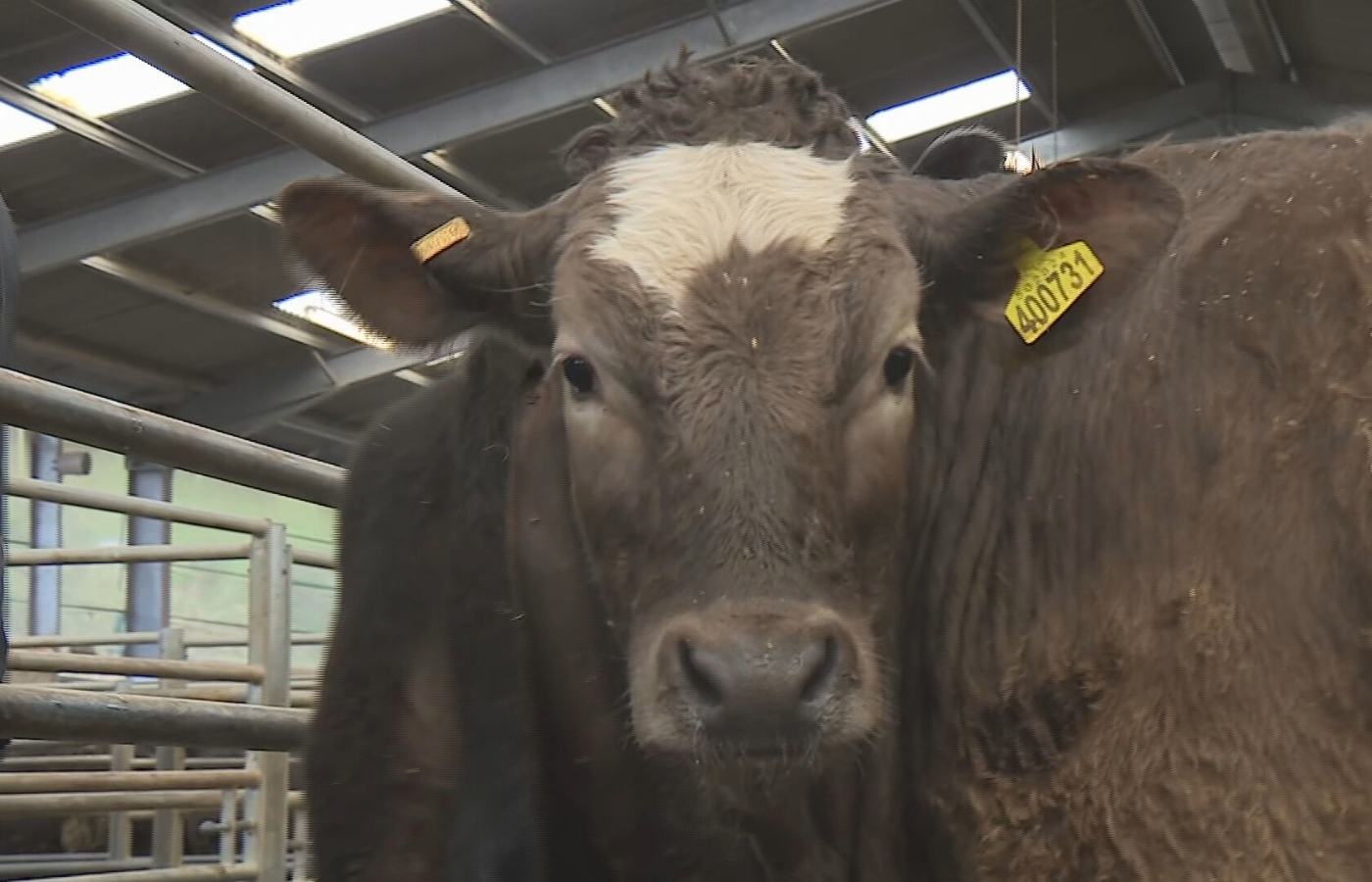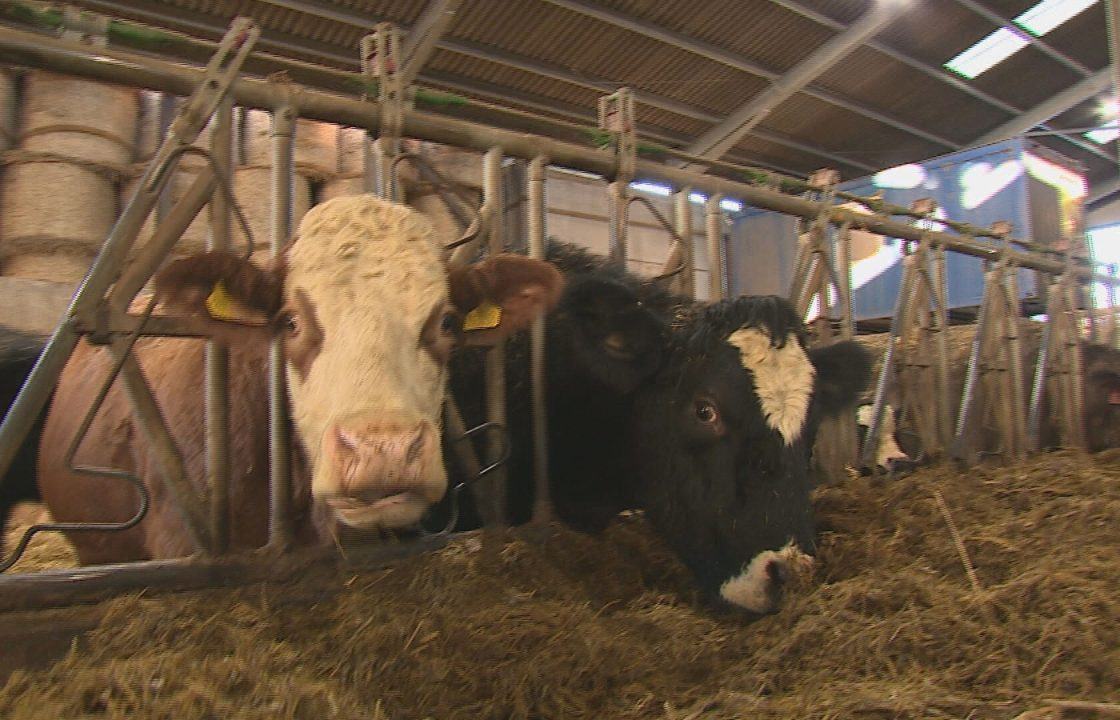Farmers in Scotland are warning the potential spread of foot-and-mouth disease among livestock could spell “wipe out” for the sector as a whole.
Scotland and the rest of the UK have introduced a ban on cattle, pig and sheep imports from Germany after the disease was discovered in the country.
The discovery was made in water buffalo in Brandenburg, prompting the risk level in the UK to be increased to medium.
Foot-and-mouth disease (FMD) does not pose a risk to human health but is a highly contagious virus that affects cattle, sheep, pigs, and other cloven-hoofed animals.
This virus spreads easily through direct contact, and airborne transmission is possible. The disease can quickly affect entire herds or flocks.
 STV News
STV NewsNFU Scotland’s Livestock Committee vice-chair John Ritchie said producers are “rightly concerned”.
He said: “This is a highly contagious disease that has the potential to destroy herds and businesses – at the very worst wipe out the livestock sector completely.
“It is important to stress there is no danger to humans or food safety nor is this disease present anywhere in the UK.
“We have not seen foot and mouth disease in Scotland since 2001 but those who lived through that period of time cannot forget the devastation and toll it took on farming communities.
“We do not wish to see that ever occurring again.
“While farmers live with the constant threat of disease returning to these shores, lessons learnt from the past have helped shaped our robust livestock traceability systems we use as part of our daily business.
“We are confident as a sector that surveillance systems are effective.
“Through surveillance and collaborative working, the isolated case in Germany, has seen Government restrictions put in place with bans on importing cattle, pork, sheep and products of animal origin from Germany, which is welcomed news.
“NFU Scotland has long called for tighter border security on all food imports, and we need these to be robust and enforced without fail.
“It is likely that some retailers who rely on imported products will be noticing the impact of the current restrictions more than others.
“We are asking our members to maintain strict on-farm biosecurity measures, comply with the swill feeding ban, report of all suspicions of notifiable diseases promptly and ensure they get proper diagnosis of any livestock presenting symptoms.
“Quickly recognising clinical signs of the disease in livestock is vital to controlling and preventing it from spreading.
“In cattle and pigs the signs of disease are usually readily seen; however, sheep do not always show obvious clinical signs and sheep farmers should be particularly vigilant.”
When was foot and mouth disease last present in Scotland?
The disease has not been presented in Scotland since 2001, and restrictions were brought in to avoid further outbreaks.
The Scottish Government said it will continue to monitor the situation while working closely with German authorities and other UK administrations.
Scotland’s chief veterinary officer Sheila Voas said: “I appreciate the concern this latest development will be causing to the farming community and wider agricultural sector in Scotland.
“We have not seen foot and mouth disease in Scotland since 2001, and, alongside government restrictions, with strict on-farm biosecurity, compliance with the swill feeding ban, and the reporting of all suspicions of notifiable disease promptly – we can avoid a further outbreak.
“Quickly recognising clinical signs of the disease in livestock is vital to controlling and preventing it from spreading.
“In cattle and pigs the signs of disease are usually readily seen; however, sheep do not always show obvious clinical signs. I would urge sheep farmers to be particularly vigilant.”
Agriculture minister Jim Fairlie said: “We have robust contingency plans in place to manage the risk of this disease to protect farmers and our food security.
“The Scottish Government’s preparedness was tested in 2018 through Exercise Blackthorn which simulated a medium to large scale foot and mouth disease outbreak that had spread from England to Wales and Scotland and I am confident in our ability to manage any such occurrence.
“I am urging livestock keepers to remain vigilant for signs of the disease and remind them they have a legal requirement to immediately report any suspicion of disease in Scotland to the local Animal and Plant Health Agency (APHA) Field Services Office.”
Kate Rowell of Quality Meat Scotland told STV News: “It is concerning the news but at the moment it is a case of staying calm and following the Scottish Government’s guidelines.
“We sign up completely to those, its important there is good biosecurity on farms, not feeding swill to pigs and the general public not discarding food.”
Follow STV News on WhatsApp
Scan the QR code on your mobile device for all the latest news from around the country
























